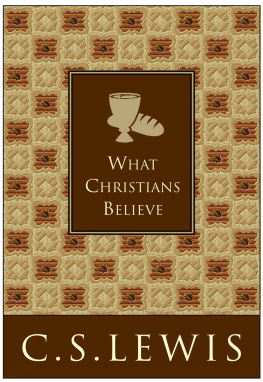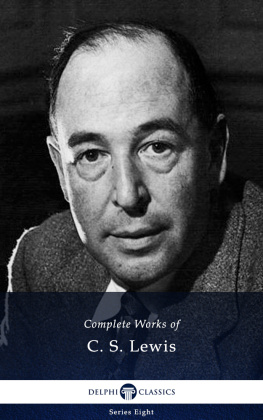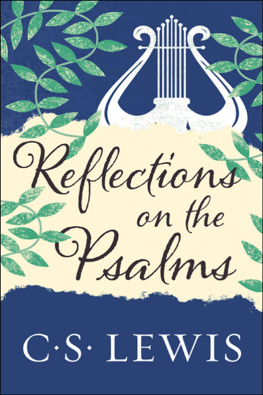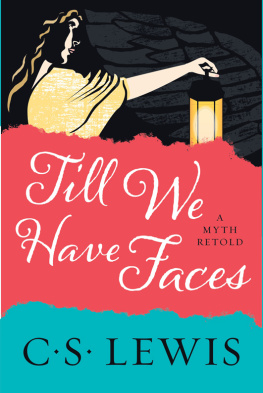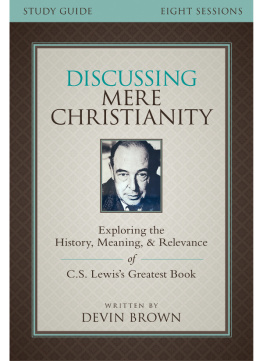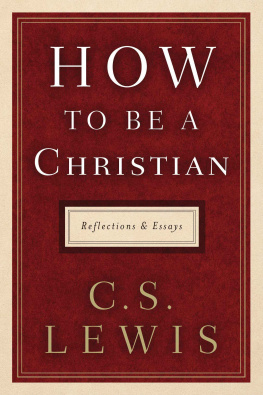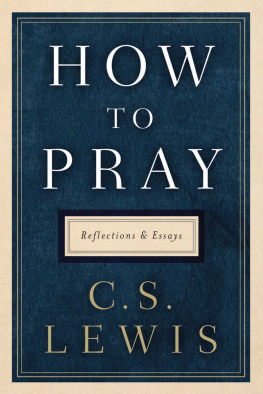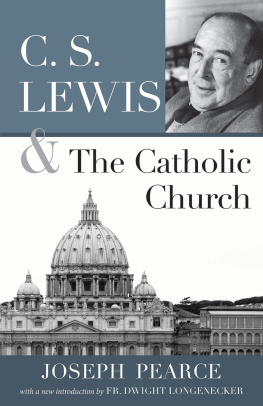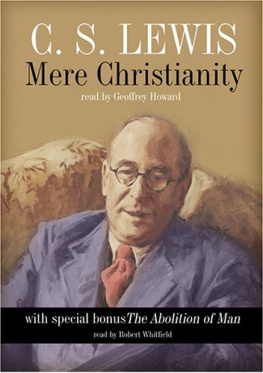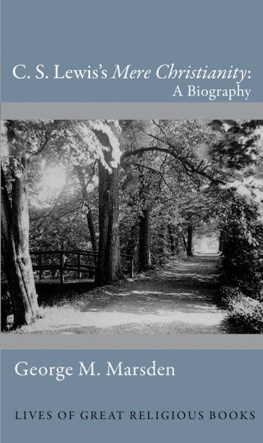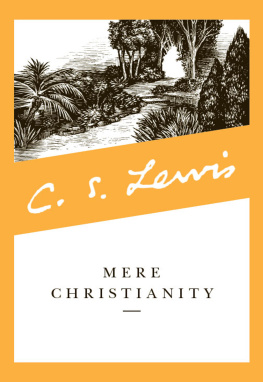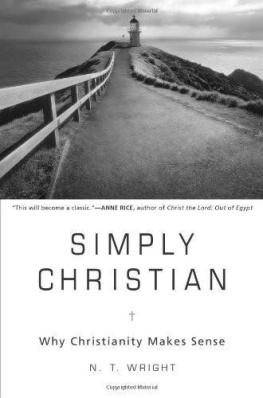C. S. Lewis - What Christians Believe
Here you can read online C. S. Lewis - What Christians Believe full text of the book (entire story) in english for free. Download pdf and epub, get meaning, cover and reviews about this ebook. year: 2009, publisher: HarperCollins, genre: Religion. Description of the work, (preface) as well as reviews are available. Best literature library LitArk.com created for fans of good reading and offers a wide selection of genres:
Romance novel
Science fiction
Adventure
Detective
Science
History
Home and family
Prose
Art
Politics
Computer
Non-fiction
Religion
Business
Children
Humor
Choose a favorite category and find really read worthwhile books. Enjoy immersion in the world of imagination, feel the emotions of the characters or learn something new for yourself, make an fascinating discovery.
What Christians Believe: summary, description and annotation
We offer to read an annotation, description, summary or preface (depends on what the author of the book "What Christians Believe" wrote himself). If you haven't found the necessary information about the book — write in the comments, we will try to find it.
The Essentials Explained
Master storyteller and essayist C. S. Lewis here tackles the central questions of the Christian faith: Who was Jesus? What did he accomplish? What does it mean for me?
In these classic essays, which began as talks on the BBC during World War II, Lewis creatively and simply explains the basic tenets of Christianity. Taken from the core section of Mere Christianity, the selection in this gift edition provides an accessible way for more people to discover these timeless truths. For those looking to remind themselves of the things they hold true, or those looking for a snapshot of Christianity, this book is a wonderful introduction to the faith.
What Christians Believe — read online for free the complete book (whole text) full work
Below is the text of the book, divided by pages. System saving the place of the last page read, allows you to conveniently read the book "What Christians Believe" online for free, without having to search again every time where you left off. Put a bookmark, and you can go to the page where you finished reading at any time.
Font size:
Interval:
Bookmark:

The contents of this book were first given on the air as radio talks and were published collectively as Mere Christianity , from which this volume is drawn.
The reader should be warned that I offer no help to anyone who is hesitating between two Christian denominations. You will not learn from me whether you ought to become an Anglican, a Methodist, a Presbyterian, or a Roman Catholic. In this book I am not trying to convert anyone to my own position. Ever since I became a Christian I have thought that the best, perhaps the only, service I could do for my unbelieving neighbours was to explain and defend the belief that has been common to nearly all Christians at all times.
The name Christians was first given at Antioch (Acts 11:26) to the disciples, to those who accepted the teaching of the apostles. There is no question of its being restricted to those who profited by that teaching as much as they should have. There is no question of its being extended to those who in some refined, spiritual, inward fashion were far closer to the spirit of Christ than the less satisfactory of the disciples. The point is not a theological or moral one. It is only a question of using words so that we can all understand what is being said. When a man who accepts the Christian doctrine lives unworthily of it, it is much clearer to say he is a bad Christian than to say he is not a Christian.
I hope no reader will suppose that mere Christianity is here put forward as an alternative to the creeds of the existing communionsas if a man could adopt it in preference to Congregationalism or Greek Orthodoxy or anything else. It is more like a hall out of which doors open into several rooms. If I can bring anyone into that hall I shall have done what I attempted. But it is in the rooms, not in the hall, that there are fires and chairs and meals. The hall is a place to wait in, a place from which to try the various doors, not a place to live in. For that purpose the worst of the rooms (whichever that may be) is, I think, preferable. It is true that some people may find they have to wait in the hall for a considerable time, while others feel certain almost at once which door they must knock at. I do not know why there is this difference, but I am sure God keeps no one waiting unless He sees that it is good for him to wait. When you do get into your room you will find that the long wait has done you some kind of good which you would not have had otherwise. But you must regard it as waiting, not as camping. You must keep on praying for light: and, of course, even in the hall, you must begin trying to obey the rules which are common to the whole house. And above all you must be asking which door is the true one; not which pleases you best by its paint and panelling. In plain language, the question should never be: Do I like that kind of service? but Are these doctrines true: Is holiness here? Does my conscience move me towards this? Is my reluctance to knock at this door due to my pride, or my mere taste, or my personal dislike of this particular door-keeper?
When you have reached your own room, be kind to those who have chosen different doors and to those who are still in the hall. If they are wrong they need your prayers all the more; and if they are your enemies, then you are under orders to pray for them. That is one of the rules common to the whole house.
Adapted from the Preface to Mere Christianity
I HAVE BEEN asked to tell you what Christians believe, and I am going to begin by telling you one thing that Christians do not need to believe. If you are a Christian you do not have to believe that all the other religions are simply wrong all through. If you are an atheist you do have to believe that the main point in all the religions of the whole world is simply one huge mistake. If you are a Christian, you are free to think that all those religions, even the queerest ones, contain at least some hint of the truth. When I was an atheist I had to try to persuade myself that most of the human race have always been wrong about the question that mattered to them most; when I became a Christian I was able to take a more liberal view. But, of course, being a Christian does mean thinking that where Christianity differs from other religions, Christianity is right and they are wrong. As in arithmeticthere is only one right answer to a sum, and all other answers are wrong; but some of the wrong answers are much nearer being right than others.
The first big division of humanity is into the majority, who believe in some kind of God or gods, and the minority who do not. On this point, Christianity lines up with the majoritylines up with ancient Greeks and Romans, modern savages, Stoics, Platonists, Hindus, Mohammedans, etc., against the modern Western European materialist.
Now I go on to the next big division. People who all believe in God can be divided according to the sort of God they believe in. There are two very different ideas on this subject. One of them is the idea that He is beyond good and evil. We humans call one thing good and another thing bad. But according to some people that is merely our human point of view. These people would say that the wiser you become the less you would want to call anything good or bad, and the more clearly you would see that everything is good in one way and bad in another, and that nothing could have been different. Consequently, these people think that long before you got anywhere near the divine point of view the distinction would have disappeared altogether. We call a cancer bad, they would say, because it kills a man; but you might just as well call a successful surgeon bad because he kills a cancer. It all depends on the point of view. The other and opposite idea is that God is quite definitely good or righteous, a God who takes sides, who loves love and hates hatred, who wants us to behave in one way and not in another. The first of these viewsthe one that thinks God beyond good and evilis called Pantheism. It was held by the great Prussian philosopher Hegel and, as far as I can understand them, by the Hindus. The other view is held by Jews, Mohammedans and Christians.
And with this big difference between Pantheism and the Christian idea of God, there usually goes another. Pantheists usually believe that God, so to speak, animates the universe as you animate your body: that the universe almost is God, so that if it did not exist He would not exist either, and anything you find in the universe is a part of God. The Christian idea is quite different. They think God invented and made the fighting religion. It thinks God made the worldthat space and time, heat and cold, and all the colours and tastes, and all the animals and vegetables, are things that God made up out of His head as a man makes up a story. But it also thinks that a great many things have gone wrong with the world that God made and that God insists, and insists very loudly, on our putting them right again.
And, of course, that raises a very big question. If a good God made the world why has it gone wrong? And for many years I simply refused to listen to the Christian answers to this question, because I kept on feeling whatever you say, and however clever your arguments are, isnt it much simpler and easier to say that the world was not made by any intelligent power? Arent all your arguments simply a complicated attempt to avoid the obvious? But then that threw me back into another difficulty.
My argument against God was that the universe seemed so cruel and unjust. But how had I got this idea of just and unjust? A man does not call a line crooked unless he has some idea of a straight line. What was I comparing this universe with when I called it unjust? If the whole show was bad and senseless from A to Z, so to speak, why did I, who was supposed to be part of the show, find myself in such violent reaction against it? A man feels wet when he falls into water, because man is not a water animal: a fish would not feel wet. Of course I could have given up my idea of justice by saying it was nothing but a private idea of my own. But if I did that, then my argument against God collapsed toofor the argument depended on saying that the world was really unjust, not simply that it did not happen to please my fancies. Thus in the very act of trying to prove that God did not existin other words, that the whole of reality was senselessI found I was forced to assume that one part of realitynamely my idea of justicewas full of sense. Consequently atheism turns out to be too simple. If the whole universe has no meaning, we should never have found out that it has no meaning: just as, if there were no light in the universe and therefore no creatures with eyes, we should never know it was dark. Dark would be a word without meaning.
Font size:
Interval:
Bookmark:
Similar books «What Christians Believe»
Look at similar books to What Christians Believe. We have selected literature similar in name and meaning in the hope of providing readers with more options to find new, interesting, not yet read works.
Discussion, reviews of the book What Christians Believe and just readers' own opinions. Leave your comments, write what you think about the work, its meaning or the main characters. Specify what exactly you liked and what you didn't like, and why you think so.

